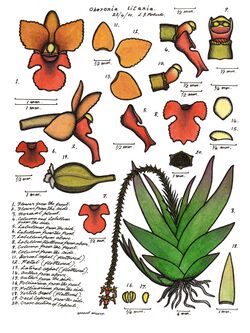Biology:Oberonia titania
| Oberonia titania | |
|---|---|

| |
| Illustration by Lewis Roberts | |
| Scientific classification | |
| Kingdom: | Plantae |
| Clade: | Tracheophytes |
| Clade: | Angiosperms |
| Clade: | Monocots |
| Order: | Asparagales |
| Family: | Orchidaceae |
| Subfamily: | Epidendroideae |
| Genus: | Oberonia |
| Species: | O. titania
|
| Binomial name | |
| Oberonia titania Lindl.[1]
| |
| Synonyms[1] | |
| |
Oberonia titania, commonly known as the soldier's crest orchid[2] or red-flowered king of the fairies,[3] is a plant in the orchid family and is a clump-forming epiphyte. It has between four and ten leaves in a fan-like arrangement on each shoot and up to 350 tiny pinkish to red flowers arranged in whorls around the flowering stem. It is found in Java, New Caledonia and eastern Australia including Norfolk Island.
Description
Oberonia titania is an epiphytic, clump-forming herb. Each shoot has between four and ten fleshy, lance-shaped to egg-shaped, green or greyish leaves 40–60 mm (1.6–2.4 in) long and 3–5 mm (0.12–0.20 in) wide with their bases overlapping. Between 50 and 350 pinkish to red flowers about 1.2 mm (0.047 in) long and 1.0 mm (0.039 in) wide are arranged in whorls of between six and eight on an arching to hanging flowering stem 30–80 mm (1.2–3.1 in) long. The sepals and petals are egg-shaped, spread widely apart from each other and about 0.9 mm (0.035 in) long. The labellum is cup shaped, about 1.0 mm (0.039 in) long and 0.6 mm (0.024 in) wide with three lobes. Flowering occurs between January and June.[2][3][4]
Taxonomy and naming
Oberonia titania was first formally described in 1859 by John Lindley who published the description in Folia Orchidaceae.[5][6]
Distribution and habitat
The soldier's crest orchid grows on trees in rainforest and moist gullies in Java, New Caledonia, New South Wales including Norfolk Island and in Queensland.[1][7]
Conservation
This orchid is classed as "vulnerable" under the New South Wales Government Biodiversity Conservation Act 2016. The main threats to the species are habitat degradation and loss, and illegal collecting.[3]
References
- ↑ 1.0 1.1 1.2 "Oberonia titania". World Checklist of Selected Plant Families (WCSP). Royal Botanic Gardens, Kew. http://wcsp.science.kew.org/namedetail.do?name_id=136626.
- ↑ 2.0 2.1 Jones, David L. (2006). A complete guide to native orchids of Australia including the island territories. Frenchs Forest, N.S.W.: New Holland. p. 471. ISBN 1877069124.
- ↑ 3.0 3.1 3.2 "Red-flowered King of the Fairies - profile". New South Wales Government Office of Environment and Heritage. https://www.environment.nsw.gov.au/threatenedSpeciesApp/profile.aspx?id=10571. Retrieved 16 January 2019.
- ↑ Weston, Pete H.. "Oberonia titania". Royal Botanic Garden Sydney. http://plantnet.rbgsyd.nsw.gov.au/cgi-bin/NSWfl.pl?page=nswfl&lvl=sp&name=Oberonia~titania. Retrieved 16 January 2019.
- ↑ "Oberonia titania". APNI. https://id.biodiversity.org.au/instance/apni/503069. Retrieved 16 January 2019.
- ↑ Lindley, John (1859). Folia Orchidaceae (Part 8). London. p. 8. https://www.biodiversitylibrary.org/item/110262#page/202/mode/1up. Retrieved 16 January 2019.
- ↑ "Oberonia titania". Flora and Fauna of New Caledonia. http://endemia.nc/flore/fiche6200. Retrieved 16 January 2019.
External links
| Wikimedia Commons has media related to Oberonia titania. |
Wikidata ☰ Q7074803 entry
 |

